 © 2021 Don Yorty. All rights reserved.
© 2021 Don Yorty. All rights reserved.
On Saturday October 17 there was a reading at the Moore Homestead Playground in Elmhurst, Queens in celebration of Paolo Javier’s new book, O.B.B. (The Original Brown Boy), hot off the presses, published by Nightboat Books. A lively group of poets, artists, film-makers, colleagues and friends were there, and as appointed guests came to the microphone to read, the playground seemed to be the place to be, and the perfect metaphor for O.B.B. because the book and the playground are sights and sounds, words and people coming and going, stopping and staying, talking and playing, gliding through on bikes and baby strollers distinctly disparate together in place and time, everything one thing differently whole and wholly different too.
I got a copy of O.B.B before the reading started, planning to follow along as the readers read. The cover is by Francis Estrada, and its brilliant warm colors are comfortable to hold and invite the reader to approach and open it up.
Like the playground with its swings, drinking fountains and basketball courts, O.B.B. has its part; there are pages of comics, stories illustrated, and comics with words, there are sonnets, there is also a short story, and an essay at the end entitled “Afterward: Some Notes on bp Nichol, Captain Poetry, & Comics,” where Paolo thanks his artist friends who helped create the book; and where he also compares comics and poetry. Each, he says, has to be condensed to get to its essence, which is simply the truth; and there are only so many panels, so many lines on any given page to tell the story. There are many drawings, illustrations, cartoons, stories telling stories, and as often happens when looking at a drawing, readers make up their own stories, telling and being told.
The first drawing that caught my eye is called “Squid Ink” by the artist, Ernest Concepcion, which I like so much I want to hang it on my wall.
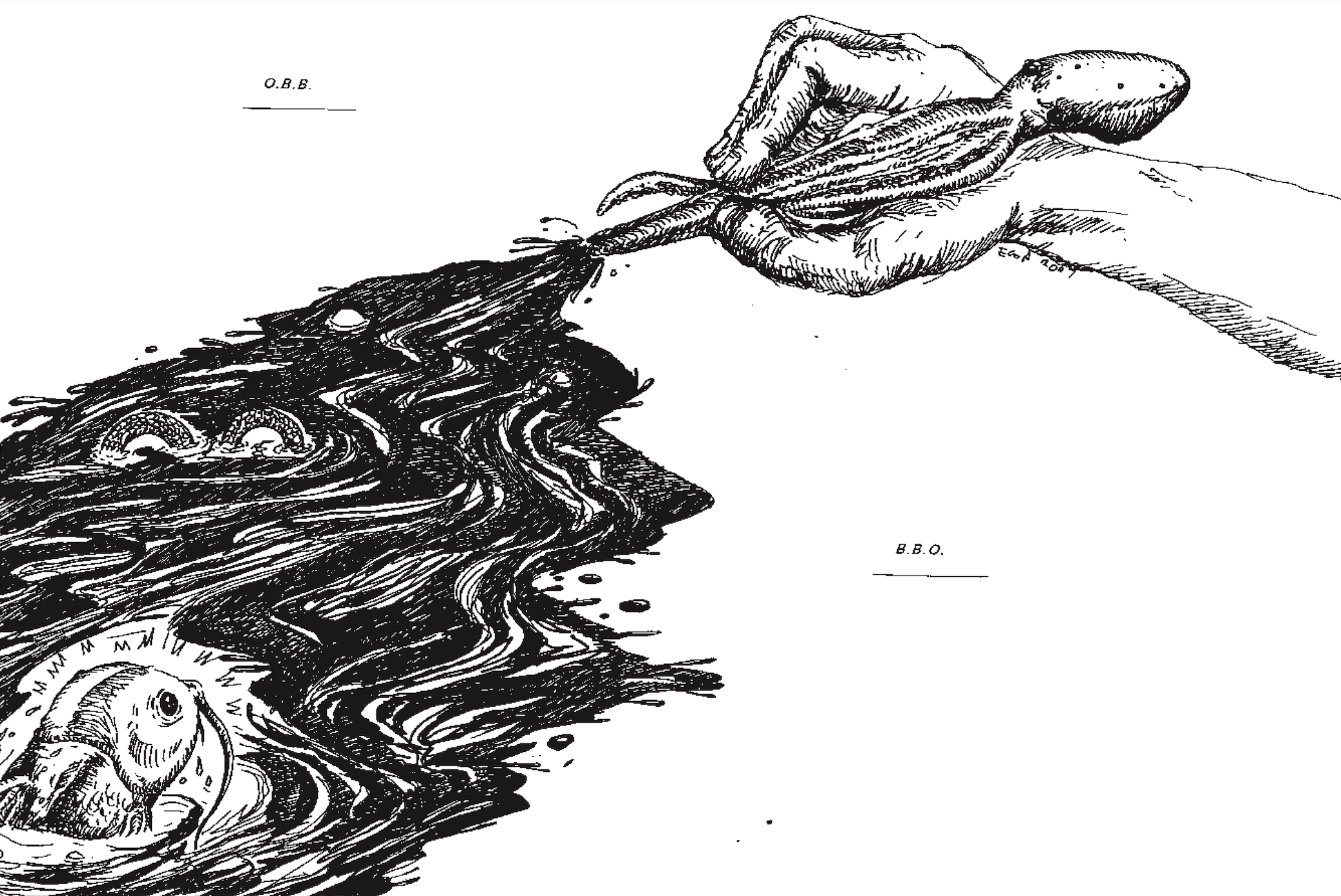
In O.B.B. there is a short story, which is part essay, called “Restrained By Time.” It is about identity, the center, the core all else springs out of, yourself. It is about Monkey Boy who wants to be himself and not what others want. When Yankee Soldier tells Yankee Nurse what to do to Monkey Boy, it becomes perfectly clear that if the invaders have to, they’ll beat your identity out of you.
For starters, give MB another dose of shrapnel with a moderate charge of cavalry, then a daily injection of rapid fire. I am thinking of grinding your ashes. I am also thinking of throwing you in a touch of saltwater!
A dollar is power; it bought Yankee Soldier a gun. Monkey Boy is brown and knows brown is fine. He doesn’t need to ask the question, “Who am I?” But when I listen to Tagalog, I hear some Spanish, and English being spoken. “Where am I?” The peripatetic Paolo Javier, partly by the winds of Fate and partly by his own volition, was born in the Philippines, indigenous then uprooted, growing up in Canada, Egypt, coming to the States to settle down, wife and kids, a man of many places, yet like the wick of a candle that can be moved from here to there in the dark, showing the way or offering light, the wick remains in the flame where it has always been.
Monkey Boy lives! In O.B.B. there is a series of sonnets called, “Remain as Beast” that can be more abstract than concrete, though they can be concrete too, and very lyrical especially in conclusion, a school of language visual like a cartoon, each word or words their own panel, one illustration next to the next, part of the whole perhaps, but each word its own story. “The sonnets,” Paolo says, “are a sequence in dialogue with experimental cinema. And I really conceived of the lines in these poems as film strips.”
In the Vimeo below, many of the sonnets from “Remain as Beast” are read. The readers who read them also read them in a film called Swerve that the filmmaker Lynne Sachs made in the playground and across the street in the Hong Kong Food Court where at one establishment, T Barr, you can get real Dao Xiao Mian, a noodle dish where the dough is sliced with a sharp knife, dumped into boiling water, and when al dente mixed with whatever the chef is adding. Fresh! In the film, when the readers read at T Barr, there is a familiarity and love each has for what they are reading. They know their poems when they read. At the end of the Vimeo, Lynne Sachs was kind enough to let me add a few minutes of the seven minute Swerve. Enjoy.
One sonnet that isn’t in the Vimeo:

And here are two more cartoons from O.B.B.
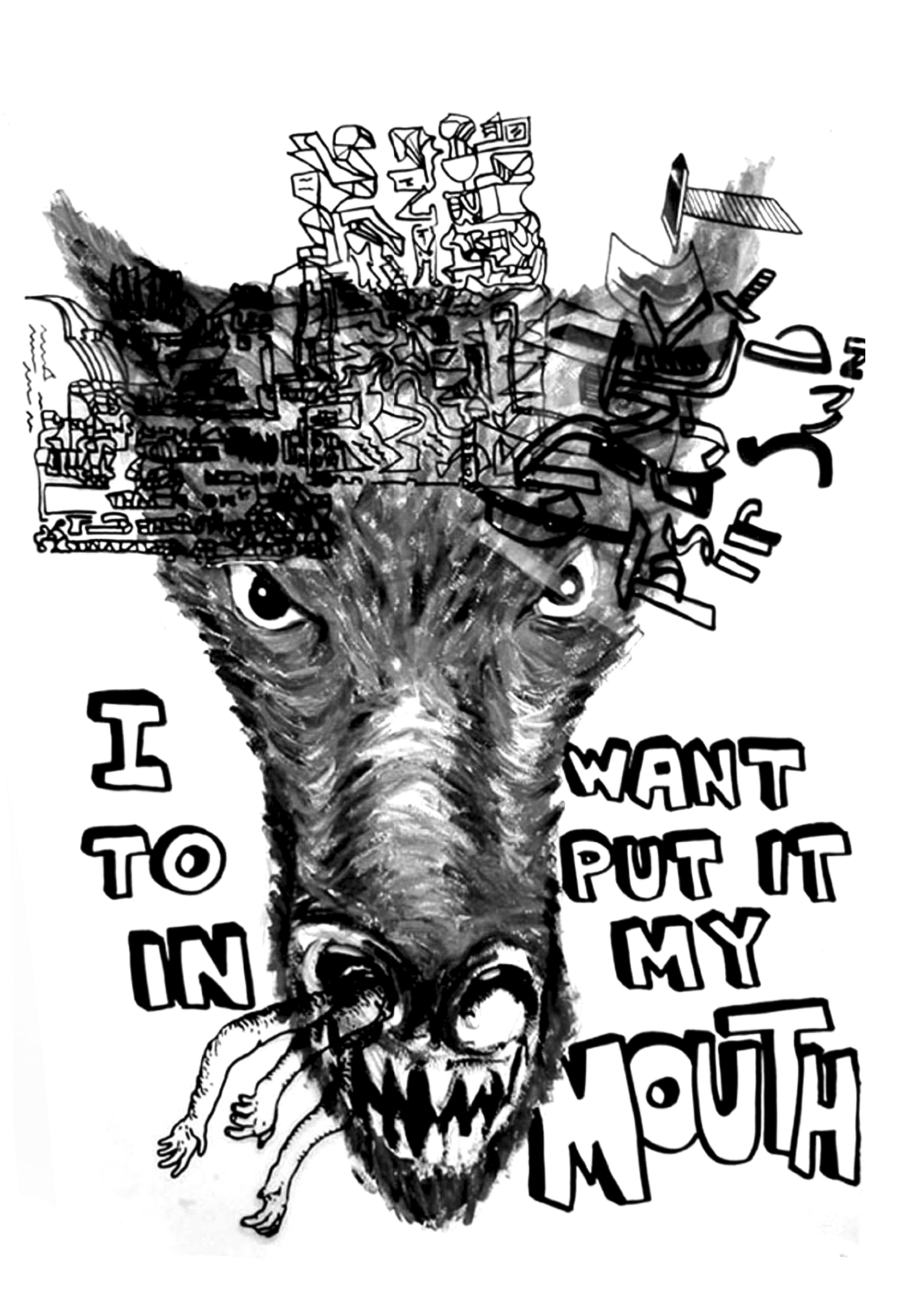
from “Restrained by Time” by Paolo Javier and Alex Tarampi
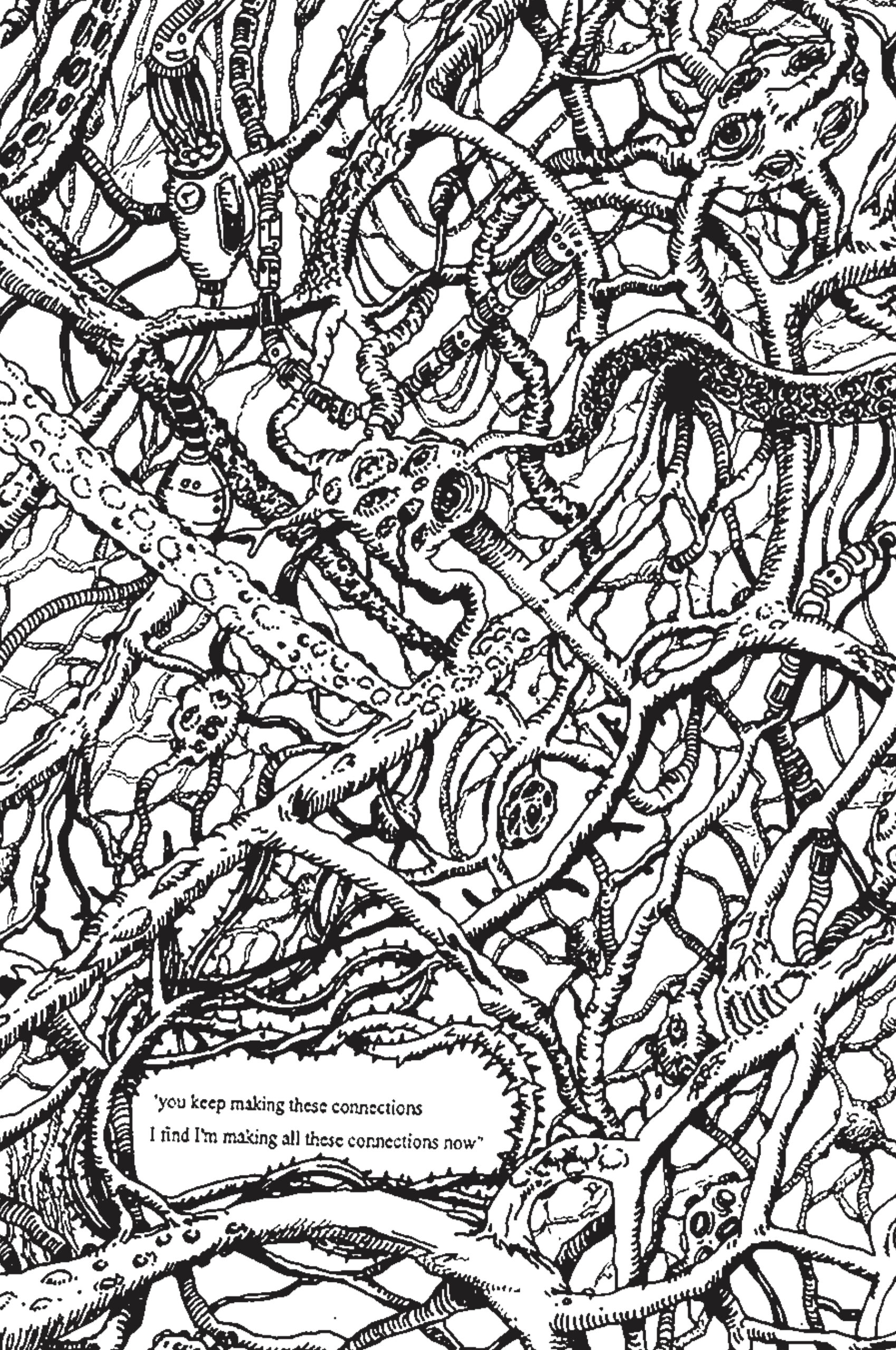
from “Aren’t You a Mess” by Paolo Javier and Ernest Concepcion

O.B.B. is published by Nightboat Books. You can check it out here:
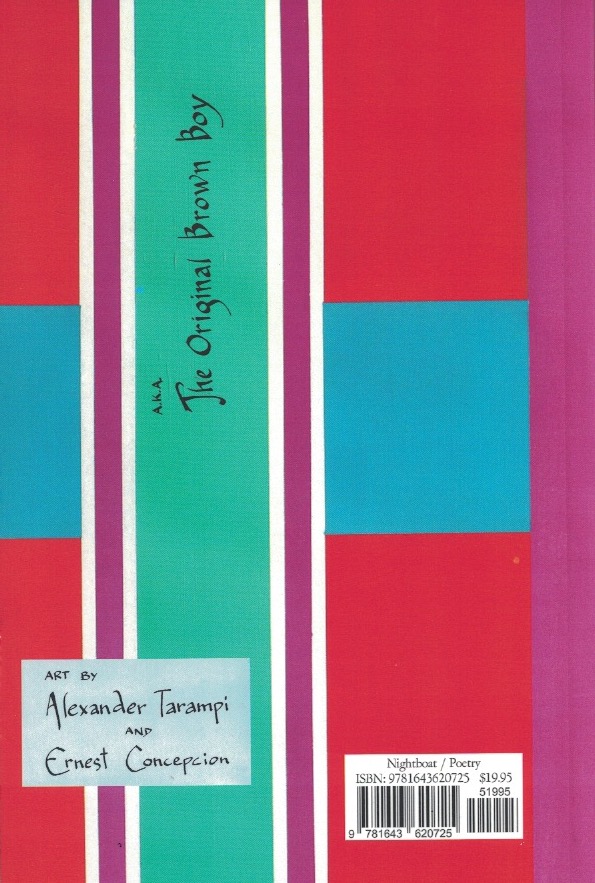
Lynne Sach’s thoughts on O.B.B. and making the film, Swerve:
“Swerve is a 7 minute film by me with poetry by Paolo Javier, who is a poet who thinks like a filmmaker. I am a filmmaker who thinks like a poet. In Swerve, we’ve come up with our own kind of movie language, or at least a dialect that articulates how we observe the world together as two artists using images, sounds and words. The first time I read Paolo’s sonnets in his new book O.B.B. aka The Original Brown Boy, I started to hear them in my head, cinematically. In my imagination, each of his 14 line poems became the vernacular expressions of people walking through a food market full of distinct restaurant stalls. I re-watched Wong Kar-wai’s “Happy Together” – a favorite of both of ours – and immediately thought of the Hong Kong Food Court in Elmhurst, Queens, a gathering spot for immigrant and working class people from the neighborhood who love good cuisine. As we all know, restaurant owners and workers experienced enormous economic hardship during New York City’s pandemic. Nevertheless, the market and the playground across the street become vital locations for the shooting of my film inspired by Paolo’s exhilarating writing. Together, we invited performers and artists Emmey Catedral, ray ferriera, Jeff Preiss, Inney Prekash, and Juliana Sass to participate in a challenging yet playful endeavor. They all said “Yes!”. On a Sunday this summer, they each devour Paolo’s sonnets along with a meal from one of the market vendors. Wearing the tell-tale masks of our daunting now, they speak his words as both dialogue and monologue. Like Lucretius’s ancient poem De rerum natura/ On the Nature of Things, they move through the market as Epicureans, searching for something to eat and knowing that finding the right morsel might very well deliver a new sensation. The camera records it all. “Swerve” then becomes an ars poetica/ cinematica, a seven-minute meditation on writing and making images in the liminal space between a global pandemic and what might come next.
It was made with the support of cinematographer Sean Hanley, sound recordist Mark Maloof, editor Rebecca Shapass, and production assistants Priyanka Das and Conor Williams.
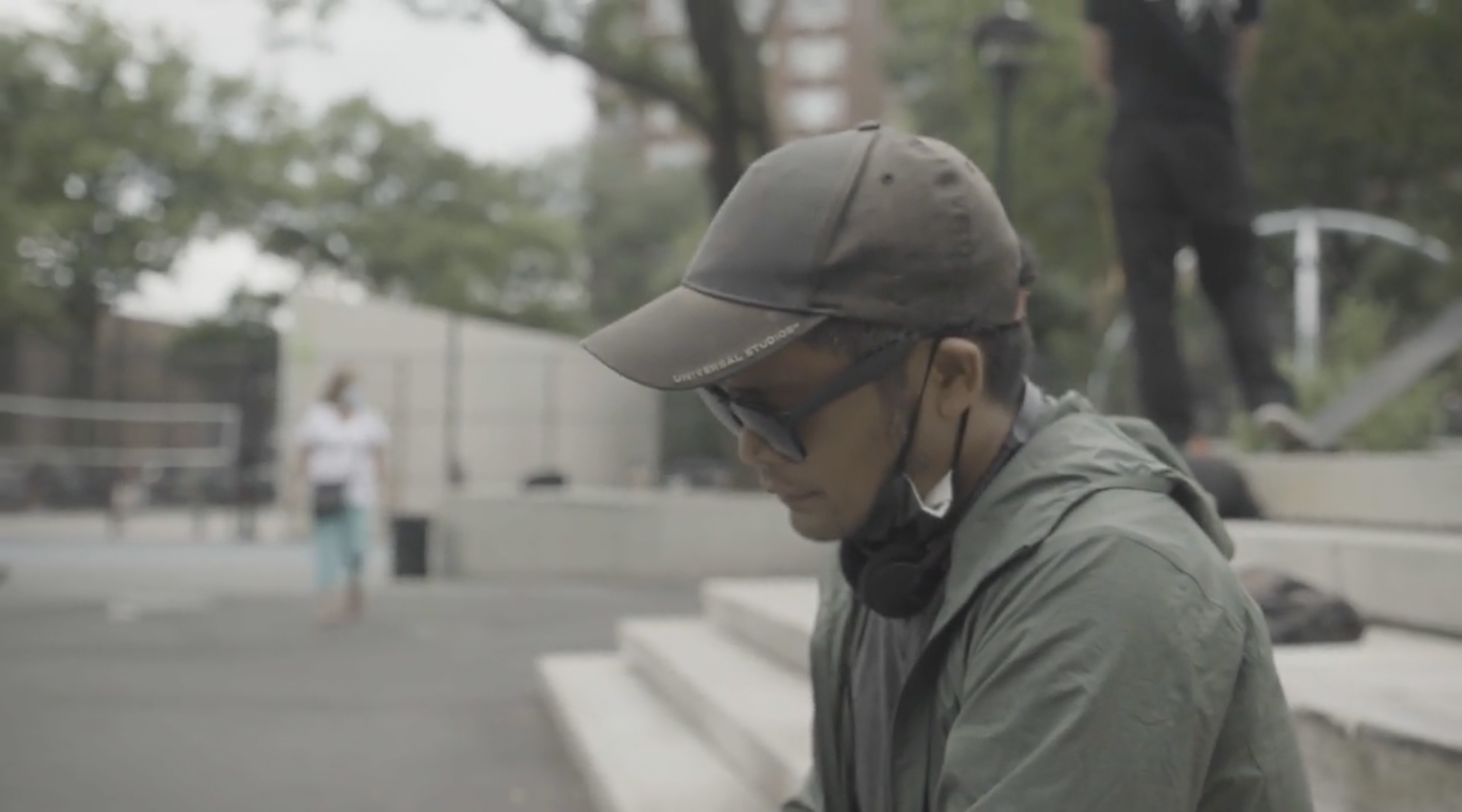 Paolo Javier from Swerve
Paolo Javier from Swerve
 Paolo Javier from Swerve
Paolo Javier from Swerve





